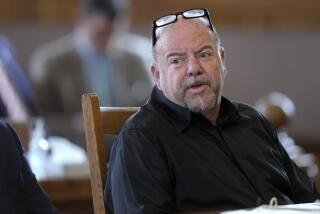Agency Cites 900-Number Phone Firms : Marketing: The FTC contends that three pay-per-call companies used deceptive ads aimed at children. Two agreed to settle the charges.
- Share via
WASHINGTON — The Federal Trade Commission said Wednesday that it filed charges of deceptive advertising against one New York telephone pay-per-call company and settled charges against two others, including a Beverly Hills firm, whose ads were aimed at children.
The FTC accused Phone Programs Inc. of New York with “deceptively and unfairly advertising and marketing” its “900” lines, which operate under a variety of names and frequently are advertised on independent television stations and cable television services.
The FTC also announced that as part of settlements of similar charges, Audio Communications Inc. of Las Vegas and Teleline of Beverly Hills agreed to tell young callers that they must have parental permission to make the call and to refund money to parents who dispute the charges.
Barry J. Cutler, director of the commission’s bureau of consumer affairs, said officials hope that the cases “will provide a clear signal as to the standards we hope to see in place” for companies that market 900-number phone lines to children.
The FTC’s action came on a complaint filed by the Boston-based advocacy group Action for Children’s Television, which saw the story lines advertised on television.
“We had presented them with a series of reasons why we believed this was the most manipulative advertising targeted for children on TV,” ACT founder and President Peggy Charren said.
The FTC said all three companies have advertised story lines that promised gifts to children who called.
To receive them, the youngsters had to follow several steps, including writing down an address given so quickly that doing so “would have challenged many adults,” Cutler said.
The calls cost $2 for the first minute and 45 cents for each additional minute.
Such calls frequently appear on telephone bills as “premium services,” with no further indication of how the charges were incurred.
The California and Nevada companies agreed to add an introductory message that tells young callers that the call costs money and that they must have parental permission to make it. The companies also will refund money to parents who dispute the charges.
Jim Feist, president of Audio Communications, said in a statement that his company “recognizes that there may be problems in offering 900-number programs to children” and would not market such services through the end of the year.
Teleline President Bob Lorsch said his company has not operated a children’s line for two years and cooperated with the FTC to help set industry standards “with some teeth in them.”
Charges against Phone Programs will be heard by an administrative law judge. If the company loses at that level, it can appeal to the commission and ultimately to the courts.
More to Read
Inside the business of entertainment
The Wide Shot brings you news, analysis and insights on everything from streaming wars to production — and what it all means for the future.
You may occasionally receive promotional content from the Los Angeles Times.










